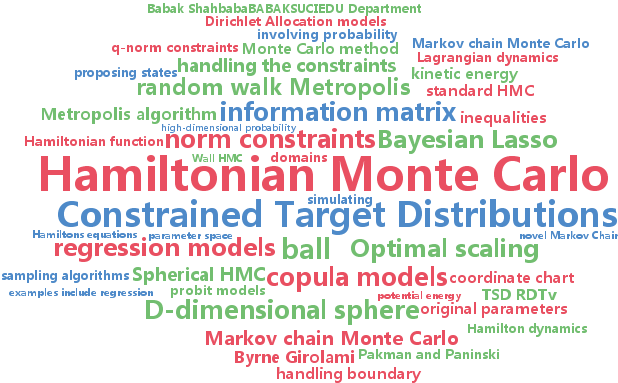hamiltonian monte carlo
-
SHIWEI LAN and Bo Zhou and Babak Shahbaba
Spherical Hamiltonian Monte Carlo for Constrained Target Distributions (pdf)
Statistical models with constrained probability distributions are abundant in machine learning. Some examples include regression models with norm constraints (e.g., Lasso), probit models, many copula models, and Latent Dirichlet Allocation (LDA) models. Bayesian inference involving probability distributions confined to constrained domains could be quite challenging for commonly used sampling algorithms. For such problems, we propose a novel Markov Chain Monte Carlo (MCMC) method that provides a general and computationally efficient framework for handling boundary conditions. Our method first maps the $D$-dimensional constrained domain of parameters to the unit ball ${\bf B
-
Jascha Sohl-Dickstein and Mayur Mudigonda and Michael DeWeese
Hamiltonian Monte Carlo Without Detailed Balance (pdf)
We present a method for performing Hamiltonian Monte Carlo that largely eliminates sample rejection. In situations that would normally lead to rejection, instead a longer trajectory is computed until a new state is reached that can be accepted. This is achieved using Markov chain transitions that satisfy the fixed point equation, but do not satisfy detailed balance. The resulting algorithm significantly suppresses the random walk behavior and wasted function evaluations that are typically the consequence of update rejection. We demonstrate a greater than factor of two improvement in mixing time on three test problems. We release the source code as Python and MATLAB packages.
-
Tianqi Chen and Emily Fox and Carlos Guestrin
Stochastic Gradient Hamiltonian Monte Carlo (pdf)
Hamiltonian Monte Carlo (HMC) sampling methods provide a mechanism for defining distant proposals with high acceptance probabilities in a Metropolis-Hastings framework, enabling more efficient exploration of the state space than standard random-walk proposals. The popularity of such methods has grown significantly in recent years. However, a limitation of HMC methods is the required gradient computation for simulation of the Hamiltonian dynamical system-such computation is infeasible in problems involving a large sample size or streaming data. Instead, we must rely on a noisy gradient estimate computed from a subset of the data. In this paper, we explore the properties of such a stochastic gradient HMC approach. Surprisingly, the natural implementation of the stochastic approximation can be arbitrarily bad. To address this problem we introduce a variant that uses second-order Langevin dynamics with a friction term that counteracts the effects of the noisy gradient, maintaining the desired target distribution as the invariant distribution. Results on simulated data validate our theory. We also provide an application of our methods to a classification task using neural networks and to online Bayesian matrix factorization.


